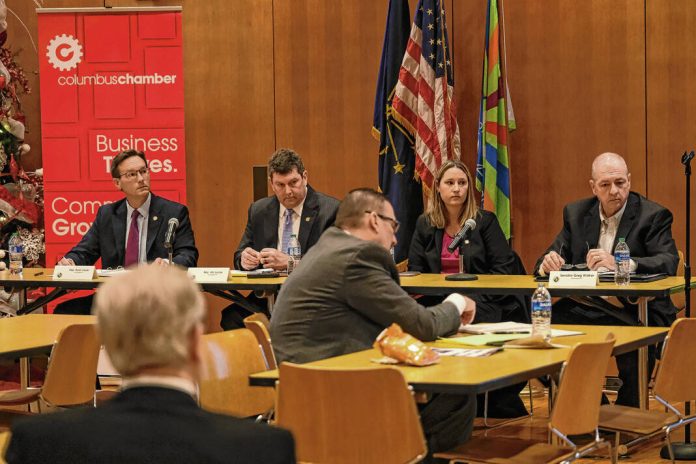
Mike Wolanin | The Republic State Reps. Ryan Lauer, from left, Jim Lucas, Jennifer Meltzer and State Sen. Greg Walker take part in a Legislative Preview Lunch moderated by John Foster and organized by the Columbus Area Chamber of Commerce at Columbus City Hall in Columbus, Ind., Monday, Dec. 11, 2023. The legislators discussed issues facing the state and what they hope to accomplish in the upcoming short legislative session.
The state lawmakers who represent parts of Bartholomew County have authored or co-authored several bills on a range of subjects during this legislative session, including child welfare, election security, guns and medical marijuana.
In total, Rep. Ryan Lauer, R-Columbus; Rep. Jim Lucas, R-Seymour; Rep. Jennifer Meltzer, R-Shelbyville; and Sen. Greg Walker, R-Columbus, have authored a combined 20 bills this session and co-authored eight others, according to state legislative records.
Many of the bills that Lauer and Walker authored involve child welfare, while criminal justice is a recurring theme in the bills that Meltzer has authored or co-authored. Two of the bills that Lucas has filed involve guns, and he has revived his efforts to legalize medical marijuana in Indiana.
The session is about to head into its third week and is expected to last until mid-March.
Rep. Ryan Lauer, R-Columbus
HB 1101
This bill would establish a new type of problem-solving court in Indiana called a “safe baby court” for children ages 3 years and younger and their families, according to state records.
The legislation defines the new type of court as a problem-solving court that seeks to address the needs of at-risk families who have a child in need of services who is 3 years or younger “by surrounding the at-risk family with support services.”
Some of the services mentioned in the bill include, among other things, services to reduce incidences of repeat maltreatment, the impact of traumatic events on the child’s brain development and promote public safety and family accountability, among other things.
Lauer said the model has been implemented in other states and that he got the idea from a Tennessee lawmaker at a national conference.
“With the standard (child in needs of services) or family court, just by the nature of these cases, they’re always adversarial. Nobody wants to be there,” Lauer said. “…In a problem-solving court model, when you have everyone at the table, even when it’s uncomfortable, that more quality work gets done, that the judge can see the progress, or lack of progress, and have a better understanding of what is in the best interest of that child.”
The bill is currently pending before the House Committee on Judiciary.
HB 1230
This proposal would require the Indiana Department of Child Services to publicly disclose additional information about child fatalities or near fatalities due to abuse or neglect.
DCS would be required to disclose the name, age and gender of the child; the child’s county of residence; confirm that the child died or nearly died due to abuse or neglect; actions taken by the department, among other things.
It also would generally require DCS to disclose the name, age, residence of the perpetrator if they were arrested; whether there had been any past reports of abuse and neglect involving the child and the perpetrator and a “detailed synopsis” of the past reports.
The bill also would require DCS to issue a public summary report within 90 days of completing its internal report into a child fatality or near fatality.
“In the fatality reports that the public has access to (currently), all the names are redacted,” Lauer said. “I want to shine daylight on these child abusers, on these perpetrators. …I want these names out there and I want to make sure that the circumstances are relayed to the public.”
The proposal is currently pending before the House Committee on Family, Children and Human Affairs. Lauer is a member of the committee.
HB 1152
This bill would eliminate the assessed value cap for property tax deductions for veterans who are disabled or ages 62 and up and have at least a 10% disability.
Under current law, the assessed value cap is $200,000. The non-partisan Legislative Services Agency estimates that, starting with taxes payable in 2026, this bill would allow an additional 20,000 veterans to claim about $280 million in added value deductions, worth about $6.1 million in taxes.
Rep. Jim Lucas, R-Seymour
HB 1146
This bill would legalize medical marijuana in Indiana for people who are suffering from severe medical conditions.
It would also direct the Indiana Department of Health to implement and enforce a medical marijuana program that permits the cultivation, processing, testing, transportation and dispensing of medical marijuana.
The bill would limit medical marijuana to people with “serious medical conditions” but does not include a list of specific conditions that would make a patient eligible for treatment. Instead, the proposal defines a “serious medical condition” as a medical condition for which a physician believes “the benefits of treatment with medical marijuana are greater than the risks.”
In addition, the bill would prohibit the “harassment” of medical marijuana users by state and local law enforcement officials.
Law enforcement officials who knowingly or intentionally perform a search or seizure of a medical marijuana patient more than twice in a 60-day period without reasonable suspicion, probable cause or a warrant could be charged with a Class A misdemeanor or a Level 6 felony.
Lucas’ bill comes as an increasing number of states have enacted laws legalizing the medical and/or recreational use of marijuana, including every state that borders Indiana.
As of April 2023, a total of 38 states and the District of Columbia allowed the medical use of marijuana, according to the National Conference of State Legislatures. A total of 24 states and the District of Columbia had legalized the recreational use of marijuana.
Illinois, Michigan and Ohio have legalized the recreational use of marijuana, while Kentucky has legalized medical marijuana only.
Lucas has authored several bills seeking to relax the state’s marijuana laws in the past, but they have not made it through the legislature.
HB 1143
This proposal would allow law enforcement agencies in Indiana to trade certain firearms they confiscate with licensed firearms dealers, firearms manufacturers and other law enforcement agencies in exchange for new firearms or other law enforcement equipment.
Under current law, local law enforcement agencies are required to dispose of confiscated firearms 180 after they were seized, according to the Legislative Research Agency.
Currently, it is unclear how many weapons would potentially be able to be traded should the bill become law.
The Bureau of Alcohol, Tobacco, Firearms and Explosives reported that 11,320 firearms were recovered and traced in Indiana in calendar year 2022.
The Indiana Prosecuting Attorneys Council reported that 92 firearms were forfeited in Indiana in fiscal year 2023.
The bill is currently pending before the House Committee on Veterans Affairs and Public Safety.
HB 1144
This bill would provide income tax credits for expenses that Indiana residents incur from receiving qualified firearms instruction or buying a qualified firearms storage device.
The bill, HB 1144, would allow a tax credit of up to $300 for individuals filing single returns or $600 for married couples who file jointly.
The bill defines “qualified firearms instruction” as a firearms safety course taught by an instructor certified by the National Rifle Association to teach firearms safety.
A “qualified firearms storage device” refers to safes, lockbox, cabinet or other container that locks and is designed to store firearms securely, as well as a locking device installed directly on the firearm that prevents the firearms from being fired.
The Legislative Services Agency estimates that the tax credits may decrease tax revenue by $23 million beginning in fiscal year 2026.
The proposal is currently pending before the House Committee on Ways and Means.
Rep. Jennifer Meltzer, R-Shelbyville
HB 1203
This bill would make an animal sedative called xylazine a Schedule II controlled substance in Indiana.
Xylazine, also known by its street name “tranq,” is a veterinary drug first developed in the 1960s as a sedative and muscle relaxer for animals like cattle, horses and elk, according to the Drug Enforcement Administration.
However, the drug, which is not approved for human use, has been popping up in “an increasing number of illicit drug mixtures” and “has also been detected in a growing number of overdose deaths” across the country, according to a DEA report.
The Bartholomew County Coroner’s Office said in its most recent annual report that the drug has been detected in toxicology screenings one time each year from 2019 to 2022. All of those cases also involved the potent synthetic opioid fentanyl.
Categorizing xylazine as a Schedule II controlled substance would make dealing the drug anywhere between a Level 2 and Level 6 felony and possessing it a Class A misdemeanor or Level 6 felony, according to the Legislative Services Agency.
Schedule II controlled substances are substances that have a high potential for abuse but also have a currently accepted medical use, including some with severe restrictions on how they can be used medically, according to the Indiana Department of Health. Some other Schedule II controlled substances include fentanyl, oxycodone, methamphetamine, among others.
The bill is currently pending before the House Committee on Courts and Criminal Code. A hearing on the bill is scheduled for Wednesday.
Sen. Greg Walker, R-Columbus
SB 170
This bill that would make it a Level 6 felony to injure or influence an election worker or knowingly interfere or obstruct their duties.
Under current law, these protections are limited to “election officers” and not everyone who is performing some sort of official duty during an election.
The bill defines an “election worker” as anyone who works for the Indiana Secretary of State’s Office, Indiana Election Division, members of county election boards, county clerks and their staff, absentee voter boards, absentee ballot counters, poll watchers, volunteers at vote centers, among other people.
“Currently, that protection extends to certain elected election officials, but it does not extend to that large congregate of volunteers on Election Day or on the days leading up to an election,” Walker said. “…There have been some concerns over those who would interfere with the election process and really put a person in an untenable position of having to face this kind of threat or scrutiny or attention. …Why not extend that protection to the volunteers?”
The bill is currently pending before the Senate Committee on Elections. Walker is the ranking member of the committee.




